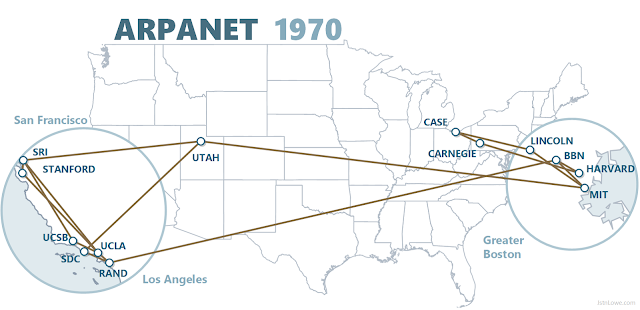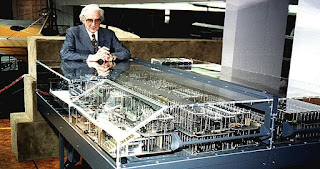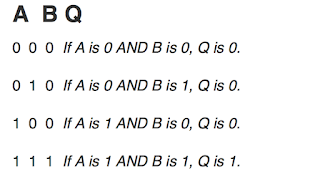Entry 4 - Leonard Kleinrock: The ARPANET
Description of Topic
In the mid 1900s, a lot of the basic computing technology that we are familiar with today had already been developed at its most basic form. Computers existed and their abilities expanded human computational power, but there still was no way to bring this computing power to the general public or a way for computer scientists to easily work collaboratively. Then came Leonard Kleinrock, who, along with fellow computer scientists Donald Davies and Paul Baran, came up with packet switched networks, the foundation for what we now know as the Internet.
Kleinrock's life is a true story of perseverance and the American dream, as he was born to a poor family of Ukrainian immigrants. Not able to afford to go to college, Kleinrock lobbied for scholarships from every town government he could reach before finally getting the opportunity to take night classes at New York City College where he excelled so much that upon his graduation, he was able to get into MIT in order to work on getting his Phd and masters degree, both of which he achieved in the late 50s and early 60s. From there Kleinrock went to UCLA to conduct research in computer science, and it was here that he created the earliest form of the internet.
Connection to Computer Science
Although Kleinrock's ARPANET didn't last into modern times, the principles that he used in creating it were instrumental in the creation of the modern internet. The internet is vastly important to computer science, as it allows computer scientists to connect with one another, and has expanded the influence of computers to non computer scientists. The internet is so vastly important to every single thing we do today and is one of the main reasons a lot of people choose to go into computer science. Without Kleinrock's innovations in packet switching, the internet may have never came to be and this very blog may have had to be written in a newspaper.
References
en.wikipedia.org/wiki/ARPANET.
2: “Internet Hall of Fame.” Leonard Kleinrock | Internet Hall of Fame, Internet Society, internethalloffame.org/inductees/leonard-kleinrock.
3: “Leonard Kleinrock.” Computer Hope, 15 Sept. 2017, www.computerhope.com/people/leonard_kleinrock.htm.
4: “Leonard Kleinrock.” History of Computers and Computing, Internet, Birth, Leonard Kleinrock, history-computer.com/Internet/Birth/Kleinrock.html.
4: “Leonard Kleinrock.” History of Computers and Computing, Internet, Birth, Leonard Kleinrock, history-computer.com/Internet/Birth/Kleinrock.html.
5: “Leonard Kleinrock.” Leonard Kleinrock's Home Page, University of California Los Angeles, www.lk.cs.ucla.edu/index.html.
7: “What Is ARPANET?” Computer Hope, 16 June 2017, www.computerhope.com/jargon/a/arpanet.htm.
6: “Packet Switching.” Wikipedia, Wikimedia Foundation, 5 Nov. 2017, en.wikipedia.org/wiki/Packet_switching.



Comments
Post a Comment